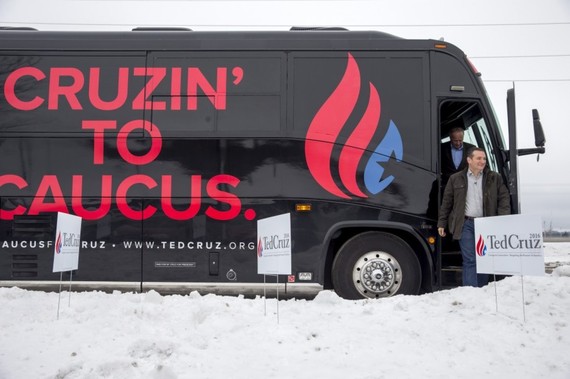Leafing through a stored copy of a political Bible carried into my first venture at covering Iowa's odd presidential nominating caucuses, I found a newspaper clipping serving as a bookmark from that 2000 campaign: "Bradley to Stay in the Race, at Least Til Super Tuesday."
That was Jan. 19, 2000, before Bill Bradley's first drubbing by fellow Democrat Al Gore, the vice president who went on to win his party's nomination.
That also was the last year that Iowans turned out on a frigid January evening to caucus for two candidates who would proceed to claim their parties' nominations for the White House: Gore and George W. Bush.
Gore beat Bradley by nearly two-to-one in Iowa's Democratic caucuses, by 63-35 percent. The governor of Texas, who also won the Iowa Republican Party's straw poll the summer before -- despite rival Steve Forbes' air-conditioned tent with French doors outside the basketball arena in Ames -- led a field of six Republican contenders. Bush drew 41 percent at his party's caucuses, Forbes 30 percent. (Orrin Hatch attracted just 1 percent of caucus-goers, despite his own best efforts, which had included Vic Damone singing Hatch's own "Jesus' Love is Like a River" in his empty straw-polll tent.)
My lasting memory of Bradley making one of his last stands before Super Tuesday, in California, is my mind's image of a tall, tired basketball legend taking the stage in a sweat-soaked, open dress shirt clinging to his skin without an undershirt -- personification of an exhaustion started in Iowa.
Since then, the hosts of the "first-in-the-nation" presidential vote have established a pretty good record of picking Democrats: They'd given Jimmy Carter his first lift in 1976 -- even if the peanut-farmer from Georgia trailed "uncommitted" caucus-goers in that crowded contest. They went with Walter Mondale in 1984. And after a wooing by Dick Gephardt in 1988 and then favorite-son Tom Harkin in 1992, Iowa's Democrats settled back down again and went with winners: Gore, John Kerry and Barack Obama.
Among Republicans in Iowa, it's been a different story lately. They'd backed Bush's father, who went on to lose the nomination to Ronald Reagan, in 1980. They went with Bob Dole over George H.W. Bush in 1988. They stuck with Dole, the nominee in 1996, and then Bush II in 2000. Yet all of these were what political scribes today would call "establishment candidates."
Lately, Iowa's Republicans have gone with outliers: Starting with Mike Huckabee, the former governor of Arkansas and Baptist preacher who liked to say to the very end of his long fight for the 2008 Republican nomination that he "majored in miracles, not math." They narrowly sided with Rick Santorum of Pennsylvania, over Mitt Romney, the former Massachusetts governor who won nomination in 2012: Just 34 votes separated the two.
The difference: A rising tide of evangelical Christians driving the outcome of the Republican caucuses in the nation's 30th-largest state.
And now, nearing another round of Iowa caucuses, odds-makers are going with Ted Cruz, a Baptist preacher's son from Texas courting the evangelical vote with a good chance of trumping "the Donald" who has dominated the party's contest for several months. (As John Edwards and others can testify, however, even a week of campaigning is an eternity in the run-up to the Iowa Precinct Caucuses, not to mention Canadian birth certificates.)
A few days into the new year, Cruz offered these thoughts at his Twitter account: "To win in 2016 we have to awaken and energize the body of Christ.' He's also tweeted: "All across Iowa and America there is an awakening and a spirit of revival'' and "We'll restore the shining city on a hill that is the United States of America.''
As his big black #CruzinToCaucus'' bus rolls out across the wintry caucus state, Cruz also jests: "I'm asking each of you to vote for me 10 times."
This may be no joke, however. For the odd assemblages of party activists who comprise the Iowa caucuses hold an outsize power, albeit sometimes a transitory power, in a contest that seizes the headlines of the day and then moves on. It is truly a minority of Iowans who have such a loud voice.
Hugh Winebrenner, professor emeritus of public administration at Drake University, first published a book in 1998 that captured all the irony of the contests: "The Iowa Precinct Caucuses: The Making of a Media Event." This was the volume I packed with me during my first tour of the state.
Carter, the author noted, launched his unlikely presidential campaign in these caucuses, even if he was beaten by "uncommitteds." Bush "beat" Reagan by 31.6 to 29.5 percent. George H.W. Bush did not carry a single Iowa county in the 1988 caucuses. Indeed the votes, he noted, are not really votes, but rather projections of how many delegates will support a candidate at state conventions -- and not always a good predictor.
"Iowa may well mislead the nation about the appeal of presidential candidates,'' Winebrenner wrote. "Attributing so much importance to the Iowa caucuses is a little like establishing the opening day winners in the major leagues as the heavy favorites to win the World Series."
"One constant," Winebrenner wrote, is Iowa's ability to "mortally wound a candidate.'' (Ask Hillary Clinton, circa 2008, when she ran third to Obama and Edwards in Iowa's Democratic caucuses. Iowa launched Obama.)
In the 2016 "media event," Clinton is up by 12.5 percentage points over Senator "Feel the Bern" Sanders, if Iowa polling is to believed. Cruz held a four-point advantage over Trump in the latest average at RealClearPolitics.
The ability of most of these polls to accurately gauge who will actually turn out on a cold caucus night for their stated favorites is doubtful at best.
And all of these Iowa polls are at least two weeks old, a double-eternity in the little state that "may well mislead the nation."
Photo credit: Ted Cruz in Boone, Iowa / (Aaron P. Bernstein/Getty Images

